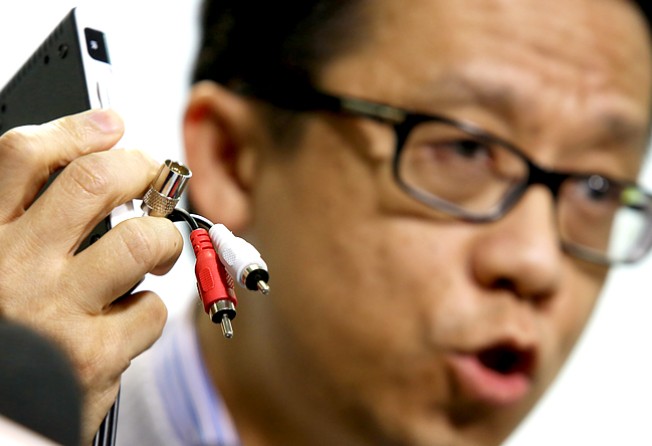HKTV boss faces roadblock over plans for mobile TV
HKTV boss says he is baffled as to why his proposed service now requires a separate free-to-air or pay-TV licence under the broadcast ordinance

Failure to integrate broadcasting and telecommunications laws in line with technological advances has further obstructed efforts by HKTV chairman Ricky Wong Wai-kay to launch his television service, critics say.
Wong, denied a free-to-air licence last year while two other applicants were approved, had planned to launch a mobile service through his recently acquired China Mobile Hong Kong.
But the Office of the Communications Authority has demanded he apply for a free-to-air or pay-TV licence if he can't guarantee his mobile service will reach fewer than 5,000 households.
Wong said mobile TV had not been subject to the Broadcasting Ordinance in the past.
While he refused to speculate on whether there were political reasons behind the action, he said he could not understand the rationale behind the change.
He said he had obtained the mobile TV licence through the acquisition of China Mobile Hong Kong last year. "They were able to cover 90 per cent [of the city's population]. Why weren't they required to apply for a free-to-air or pay-TV licence?"
HKTV has obtained a unified carrier licence, a form of telecommunications licence, for its programmes. Its content is subject to regulation by general laws but not the Broadcasting Ordinance.
Similarly, the acquisition of the mobile TV licence from China Mobile's Hong Kong unit was subject to the Telecommunications Ordinance merger and acquisition rules, not those of the Broadcasting Ordinance.
The OCA said last night that it had made the requirement because different transmission standards had been adopted. It said mobile TV operators could only offer coverage at moving locations, not households.
Information-technology lawmaker Charles Mok said the reason the government had suddenly decided to invoke the Broadcasting Ordinance was Wong's plan to use set-top boxes to allow households to watch mobile TV programmes at home.
"Under existing regulations, it wouldn't be a problem to plug receivers into mobile phones or transmit the programmes through the internet. That's why China Mobile didn't come across any problems in the past," Mok said. "But what Wong now proposes is something China Mobile didn't do before - to plug receivers into TV sets directly."
Anthony Fung Ying-him, the head of Chinese University's journalism and communication school, said: "Around the world, governments are working to encourage the convergence of different media … On the mainland, telecom signals would turn into TV signals when a user with a mobile phone walks towards a TV.
"They are not using a law, but a very technical requirement - of 5,000 specified premises - to put a stop to Wong's plan."
The government has agreed in principle to grant free-to-air licences to Cable TV and Now TV, with the details to be negotiated.
"By treating Wong differently, the government is giving a very bad impression," Fung said. "It has turned Hong Kong into a city of unfair competition."
Lawmaker Claudia Mo said: "HKTV has had that licence for months, but the authorities didn't give it any warning about possible breaches. It just seems like the government is trying to find anything to ruin HKTV."
RICKY WONG’S TELEVISION SCHEDULE
JANUARY 2003
Then City Telecom (CTI) chairman Ricky Wong Wai-kay prepares to launch internet-based pay-TV services under CTI's internet business unit - Hong Kong Broadband Network - after the government says there is no need for a broadcasting licence because the company's pay-TV service is based on an open internet platform
DECEMBER 2008
Wong is named ATV chief executive officer; he steps down after just 12 days
DECEMBER 2009
CTI applies for a free-to-air television licence
AUGUST 2011
CTI invests HK$600 million in a plan to build a television and multimedia production centre in Tseung Kwan O
APRIL 2012
CTI, focused on entering the free-to-air television market, agrees to sell its telecommunications assets for HK$5.01 billion to a company backed by British buyout firm CVC Capital Partners
DECEMBER 2012
CTI changes its name to Hong Kong Television Network, and its new station is named HKTV
OCTOBER 2013
HKTV loses its bid for a free-to-air licence, sparking a public outcry. Wong announces a plan to axe 320 HKTV employees.
DECEMBER 2013
Wong says HKTV will press ahead with its broadcasting plans by launching internet television services from July 2014, and promises to rehire those he retrenched. He unveils his plan after the company's HK$142 million acquisition of China Mobile Hong Kong, a subsidiary of state-owned China Mobile, which has a unified carrier licence that allows it to offer mobile television services through its broadcast spectrum
JANUARY 2014
China Mobile investigates the HK$142 million deal, saying it might have violated mainland rules. Wong applies for a judicial review against the government's rejection of his free-to-air licence application. Existing free-to-air broadcaster TVB announces a plan to end the lease of six transmission stations to China Mobile Hong Kong by July 6, putting HKTV's internet television plans in jeopardy.
MARCH 2014
HKTV says it will halt plans to launch its digital television services in July and suspend the filming of all new television programmes